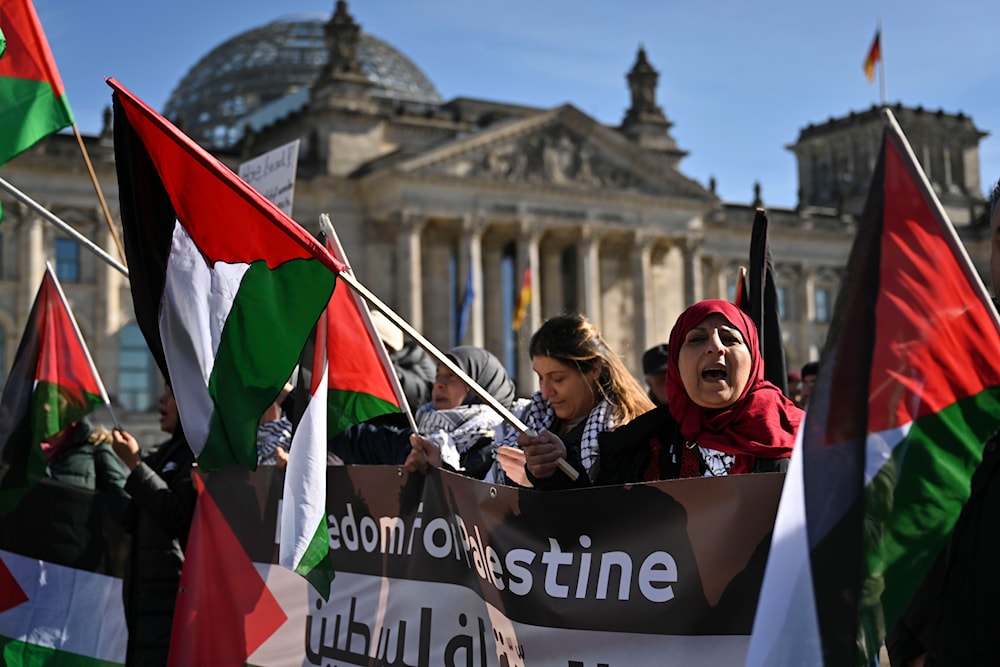Rights lawyers pushing to stop German arms deliveries to 'Israel'
Rights lawyers are advocating for the German government to reassess its arms deliveries to the Israeli occupation amid the ongoing genocide in Gaza.
-

People with Palestinian flags protest in front of the Reichstag at a demonstration during a visit of Israeli Prime Minister Benjamin Netanyahu in Berlin, Germany, March 16, 2023 (AP)
Human rights lawyers have taken decisive action, filing an urgent appeal against the German government on Friday, which is aimed at halting the export of weapons to the Israeli occupation.
This legal move comes amidst growing concerns about such weaponry being utilized in manners contravening international humanitarian law within Gaza.
The impetus for this legal action gained momentum following a Dutch court's recent ruling instructing the Netherlands to cease all exports of F-35 fighter jet components to the Israeli occupation.
The court's decision stemmed from apprehensions that these military supplies were being deployed in assaults targeting civilian locations within the besieged Gaza Strip.
In Berlin, the legal challenge, spearheaded by several entities including the European Legal Support Center (ELSC), Law for Palestine, and the Palestine Institute for Public Diplomacy, was formally lodged in an administrative court.
This lawsuit represents the interests of Palestinians residing in Gaza, aiming to curtail arms deliveries and support provided by Germany to the Israeli occupation, which transgresses Germany's obligations under the War Weapons Control Act.
ICJ ruling ignored
The legal representatives underscored a pivotal ruling issued by the International Court of Justice (ICJ) in January, urging "Israel" to take preventative measures against acts of genocide in Gaza, an area that has endured persistent sieges and invasions following Hamas' assault on October 7.
Despite the Israeli occupation's denial of genocide allegations, the lawyers emphasized that the mere suspicion of weapons being deployed in ways violating international law warrants the revocation of arms exports under existing legislation.
Ahmed Abed, a prominent lawyer involved in the case, expressed optimism regarding a swift judicial resolution, anticipating a ruling within the forthcoming two to three weeks.
In response to inquiries regarding the ongoing court proceedings, German government spokesperson Christiane Hoffmann refrained from offering specific commentary but reiterated the government's commitment to evaluating each arms export application meticulously, with due regard for human rights and humanitarian law.
Experts in international law caution that while legal recourse through administrative channels may not guarantee an immediate cessation of arms exports, it could compel the German government to reassess its policies, particularly if substantiated evidence is presented.
German 'transparency'
Max Mutschler, a senior researcher at the Bonn International Center for Conflict Studies, emphasized the potential for heightened political pressure on Berlin to enhance transparency surrounding arms transfers to the Israeli occupation.
Meanwhile, legal analysts suggest that the case might find greater traction if escalated to the ICJ in The Hague.
Holger Rothbauer, a lawyer who previously litigated against arms manufacturer Heckler & Koch, emphasized the necessity of a legal framework to address such cases adequately.
Rothbauer noted that the current German law lacks provisions enabling parties affected by administrative decisions to challenge them directly—a hurdle the rights lawyers aim to overcome by representing the interests of Palestinians impacted by the arms exports.
Against the backdrop of escalating casualties in Gaza, where the latest update from the Gaza health ministry reported over 33,000 Palestinians killed and 75,750 wounded since October 7, international pressure on the Israeli occupation to cease hostilities and facilitate humanitarian aid intensifies.
Critics argue that governments, including staunch allies like Germany and the United States, should consider withholding military aid to compel "Israel" to permit unfettered aid access to the enclave.
Despite Germany's historical commitment to supporting Israel, underscored by its approval of arms exports valued at 326.5 million euros ($353.70 million) in the preceding year—an exponential increase compared to 2022—the current legal challenge signifies a critical juncture in reevaluating the link between arms transfers and compliance with international humanitarian law.
No more excuses
German Foreign Minister Annalena Baerbock insisted, on Friday, that "Israel" should no longer offer justifications for delaying the delivery of aid to Gaza, following the Israeli government's claims of plans to open additional routes for aid into the Palestinian territory.
"The people in Gaza need every aid package now... We expect the Israeli government to implement its announcements quickly," Baerbock said on X.
"No more excuses," she stressed.
In a similar context, a spokesperson for the German Foreign Ministry remarked on Friday that the assaults resulting in the Israeli killing of seven food aid workers from the World Central Kitchen (WCK) charity organization in Gaza reflected negatively on the behavior of the Israeli military.
This comes shortly after the primary UN organization in Gaza, UNRWA, cautioned previously that famine was approaching.
"The clock is ticking fast toward famine and UNRWA must be allowed to do its work, and reach the north on a regular basis with food and nutrition supplies," the agency said.
While Germany calls for aid, it is against halting arms to "Israel". Diplomatic sources informed Al Mayadeen, on Thursday, that German Foreign Minister Annalena Baerbock urged NATO allies to block a draft UN resolution calling for an immediate cessation of arms exports to "Israel".

 5 Min Read
5 Min Read










